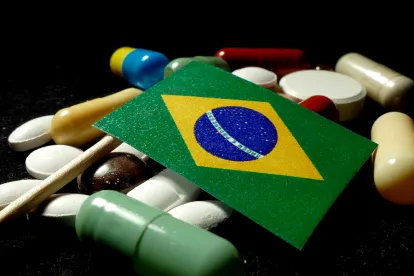On March 13, 2017, the board of directors of Agencia Nacional De Vigilancia Sanitari’s (ANVISA) announced that they had reached a new agreement with the Brazilian Patent Office, namely, the Instituto Nacional da Propriedade Industrial (INPI), concerning the prior approval provision under Article 229-C of the Brazilian Patent Statute. On April 12, 2017, after an event with several authorities and President Michel Temer, ANVISA and INPI published a written version of the new joint guidelines #1/2017 (translation enclosed here: INTERAGENCY ORDINANCE). These guidelines describe the new workflow between ANVISA and INPI involving the examination of pharmaceutical patent applications.
Article 4 of the guidelines establishes that ANVISA will analyze whether a patent application is contrary to public health. According to Article 4, a patent application claiming a product or process is considered to be contrary to public health when the product or process presents a “health risk”. The article further states that the “health risk” will be characterized when the pharmaceutical product comprises, or the pharmaceutical process results in a substance that has been prohibited in the country”.
If a product or process is found to pose a “health risk” (as defined in the Annex I of the Ministry of Health’s Ordinance #344 of 1998), ANVISA will deny prior approval and will send the application back to INPI for further handling. At this point, INPI will publish the definitive dismissal of the application. In other words, the application is denied.
The guidelines contain a new approach in the examination of patent applications claiming pharmaceutical products and processes of interest under the Brazilian government’s drug policies and pharmaceutical assistance of the National Healthcare System (SUS). Under Article 5, ANVISA will examine these applications of interest and prepare a “technical” opinion as to whether the claims meet the patentability requirements under Brazilian law. This opinion will be sent to INPI for use as a third-party observation under Article 31 of the Patent Statute of 1996. Once INPI receives ANVISA’s opinion, it is “free” to decide whether or not to agree with it. In the event INPI disagrees with ANVISA’s opinion and grants the patent application, it will send ANVISA a list containing all granted patents and will continue to make this list available to ANVISA (Article 7 of the guidelines).
The guidelines do not contain any information as to what ANVISA can or should do with the list of granted patents received from INPI. Actions that ANVISA could take include filing a post-grant opposition or seeking invalidity of the patent before Federal Courts.
Article 9 of the guidelines creates an Interagency Group between the two agencies. The purpose of this group is to seek to “harmonize” the understanding between the ANVISA and INPI regarding the application of patent law in “polemic” topics such as Markush claiming, selection inventions, the patentability of new uses, salts, polymorphs and antibodies, as well as other issues relevant to the pharmaceutical industry. One concern is that such “harmonization” could result in an unlawful administrative ban of claims that are currently being allowed INPI. As such, Article 9 gives ANVISA power to influence the INPI in a multitude of ways.
Additionally, it is important to note that the new guidelines come after several decisions were obtained against ANVISA by various pharmaceutical companies (See our post here) holding that that the agency lacked the statutory authorization to examine patentability requirements under Brazilian law. After these early decisions were rendered (which held that ANVISA’s prior approval review was restricted solely to the analysis of potential public health issues and not patentability requirements), ANVISA amended its guidelines to include a provision stating that “the granting of patents that do not fulfil the patentability requirements violates public health”. This change was interpreted by the courts as an attempt by the agency to escape the unfavorable case law and avoid the new guidelines.
As a whole, the guidelines read like an attempt by ANVISA to revive its ability to participate in the examination of pharmaceutical patent applications. Interestingly, many the associations representing generic companies in Brazil such as ABIFINA and Pro Generics are celebrating the guidelines as a victory for the local industry.
Roberto Rodrigues Pinho from Licks Attorneys is co-author of this article.




 />i
/>i

